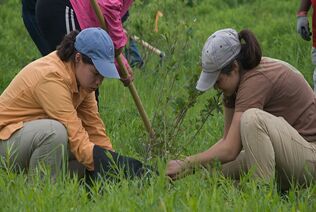菲律宾新法案,想毕业,先种树
|
Environmental issues are at the forefront of many people’s minds, but it’s the younger generation who is particularly concerned about the future of our planet. From global school strikes for climate change action to amazing teen activists, kids are now having to take it into their own hands to ensure they will grow up in a sustainable world. In an effort to foster this love and care for the earth, a new bill has been passed in the Philippines that requires students to plant 10 trees each before graduating.
The Graduation Legacy for the Environment Act was introduced by congressman Gary Alejano in 2016 in a bid to promote “inter-generational responsibility” for the environment. On May 15, 2019 it was officially passed, marking a huge step in the right direction towards a healthy planet. "While we recognize the right of the youth to a balanced and healthy ecology… there is no reason why they cannot be made to contribute in order to ensure that this will be an actual reality,” Gary Alejano commented on the bill. The Philippines has lost more than 30% of its forest cover due to illegal logging, but the new bill means that the younger generation can help to reverse the issue. Under the new initiative, 175 million new trees could be planted by students each year. If only 10% of them survive, that means that 525 billion trees could flourish over the course of one generation. According to the details outlined in the bill, the rule applies to all students in order to graduate primary school, high school, and college. Trees can be planted in either forests, mangroves, reserves, urban areas, abandoned mining sites, or in indigenous territory. In fact, this isn’t the only positive initiative that involves the younger generation. One school in India made its students pay their “school fees” by collecting, bringing to school, and recycling plastic waste that was lying across the town. This type of initiative helped raise awareness about plastic waste in Asian countries. It also allowed more students to seek education and even helped the students to earn some money by recycling the plastic so they wouldn’t have to resort to child labor in order to survive. |









